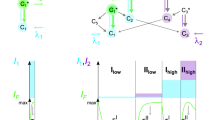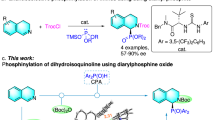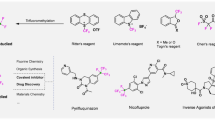Abstract
IT has been suggested1,2, on the basis of kinetic measurements, that the fluorophosphonates inhibit esterases by virtue of a highly specific affinity for the active centres of this group of enzymes. Preliminary experiments with di-isopropyl fluorophosphonate containing phosphorus-32 have given results which are in accordance with this view.
This is a preview of subscription content, access via your institution
Access options
Subscribe to this journal
Receive 51 print issues and online access
$199.00 per year
only $3.90 per issue
Buy this article
- Purchase on SpringerLink
- Instant access to the full article PDF.
USD 39.95
Prices may be subject to local taxes which are calculated during checkout
Similar content being viewed by others
References
Mackworth, J. F., and Webb, E. C., Biochem. J. 42, 91 (1948).
Webb, E. C., Biochemical Society Symposia No. 2, 50 (1948).
Strelitz, F., Biochem. J., 38, 86 (1944).
Jansen, E. F., Nutting, M. D. Fellows and Balls, A. K., J. Biol. Chem., 179, 201 (1949).
Saunders, B. C., and Worthy, T. S., Nature, 163, 797 (1949).
Author information
Authors and Affiliations
Rights and permissions
About this article
Cite this article
BOURSNELL, J., WEBB, E. Reaction of Esterases with Radioactive Di-isopropyl Fluorophosphonate. Nature 164, 875 (1949). https://doi.org/10.1038/164875a0
Issue date:
DOI: https://doi.org/10.1038/164875a0



